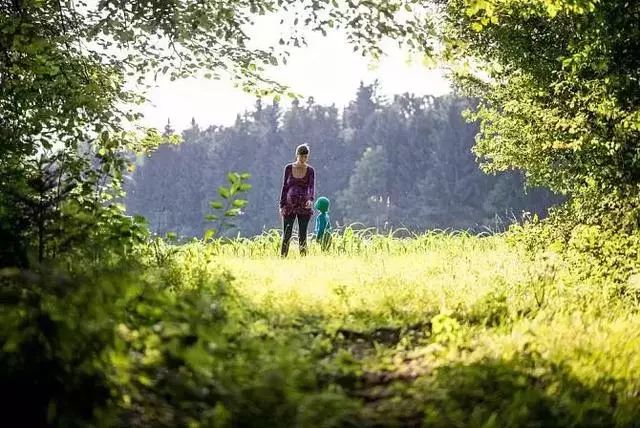Bright sunshine and negative oxygen ions in the air have been shown to relieve depression; viewing the beauty of nature can enhance one’s control of heart rate and blood pressure; listening to the sounds of nature can help people recover from high stress.
In addition, studies have shown that in a wooded natural environment, just three days and two nights can improve a person’s immune system and create a sense of well-being that lasts for seven days.
Healing happens to everyone, without exception
Geologist Peter Wayne has been exploring the Grand Canyon since the 1960s.
He has repeatedly witnessed a team organization called “Team River Runners” holding sixteen-day kayaking trips on the Colorado River.

Among them was a veteran who returned from Iraq. His body was full of shrapnel, he had a bad temper, could only say “fuck you”, and even lost the simplest calculation ability.
However, by the end of the trip, he was talking nonstop, full of gratitude for the beauty of the canyon and his companions.
Peter Wayne said:
The longer the trip, the greater the healing power. Healing happens to everyone, without exception.
Nature is always a sanatorium
Jiang Xun once wrote in “Four Lectures on Appreciation”: Nature can really heal us, it can relax our entire busy mood and find ourselves.
Lin Yutang also mentioned in “The Art of Living”: Nature itself is always a sanatorium. Even if it cannot cure other diseases, it can at least cure human megalomania

Nature deserves the praise of all writers and artists, but it is not limited to this kind of sentimental praise.
Lin Yutang was only half right, because modern research has shown that nature can indeed cure other diseases besides “megalomania”.
Scientists from the University of Illinois at Urbana-Champaign published an article in Frontiers in Psychology stating that nature has 21 possible ways to improve health.
Among them, it has been confirmed that bright sunshine and negative oxygen ions in the air have been proven to relieve depression; viewing beautiful scenery in nature can enhance one’s control over heart rate and blood pressure; listening to the sounds of nature can help people recover from high stress.
In addition, studies have shown that in a natural environment with lush trees, only three days and two nights are needed to improve a person’s immune system and create a sense of happiness that lasts for seven days.
Nature and exercise
A study led by Stanford University found that exercising in the wild is more helpful in reducing the risk of depression than exercising in the city.
Participants walked in a grassy area in the country

side and on a road in the city. Afterwards, the researchers examined an area of the brain involved in contemplative thinking and found that those who walked in the rural areas had reduced activity in this part of the brain, while those who walked in the urban environment showed no change.
Nature and Attention
A University of Michigan psychology lab found that memory and attention span increased by 20 percent after an hour of interacting with nature, and the benefits were present on both sunny days and cold winter nights.
The results of this study suggest that it is important to ensure that students have adequate exposure to nature as they learn and develop, especially those with ADHD and other attention disorders.
Nature education becomes the new “healing method”
Scientists also believe that children need to be exposed to nature more than adults. Kathryn Wolff of the University of Washington’s School of the Environment said:
If children do not spend enough time experiencing nature at a young age, they will not develop the proper immune function to protect themselves as they grow older. Bathing in nature can ingest the things that produce a healthy microbiome.

In recent years, nature education schools have sprung up around the world, providing children with the opportunity to have close contact with nature on a regular basis.
In addition to being able to treat the “nature deficit disorder” of ordinary children, as nature education is studied and understood by more people, another function of nature schools has gradually begun to be valued.
Some children with autism, sensory processing disorder or attention deficit hyperactivity disorder (ADHD) have begun to follow the doctor’s advice and look for nearby nature education schools for learning and “treatment”.
Alexander is a boy who has just been diagnosed with autism. He is afraid of noise and has difficulty concentrating. His mother asked the doctor if he could send her child to a nearby forest school for education.
After learning about the teaching method of this school, the doctor told her that it was perfect for Alexander.
Then, Alexander came to the Dandelion Forest School near his home to socialize and learn in a completely outdoor environment. After one semester, the child’s condition has improved significantly. His mother said:
In Dandelion, he is confident, has firm friends, and receives kind support and encouragement. He has always been afraid of heights and can now climb very confidently. He described to us the “lava game” he was playing: he and a group of friends climbed up and jumped off a fallen tree, and he felt “a little scared but brave enough to jump down”, and was proud of it.
The American Cedarsong Nature School, which we just introduced, can also accept two special children in each course.

In September 2017, a two-year-old autistic child was sent here. He could not speak yet and would slam his ears or run away in a new environment.
However, to his mother’s surprise, from the first day here, her son never showed these maladaptive movements at Cedarsong and refused to leave every time he came home from school.
So she decided to increase her son’s attendance to 3 days a week.
Over the past six months, I have seen my son grow and develop in amazing ways. He has been given the space he needs and developed a sense of resilience and independence. This ultimately made him feel safe and calm, and finally ready to communicate with other children and teachers in a more positive way. Now, I have decided to postpone PT (physical therapy) and OT (behavioral therapy), and I feel confident that forest therapy is exactly what my son needs.

The doctor also believes that non-institutional, free play and socialization outdoors is perfect for children and can even complement or replace traditional physical and speech therapy.
Most importantly, the “green prescription” from nature’s sanatorium has other advantages: it has no side effects, leaves no traces, is inexpensive and is readily available.
